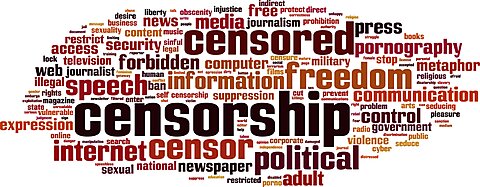On December 6, the New Civil Liberties Alliance announced it was suing the Department of State for censoring two right‐of‐center media outlets, the Daily Wire and The Federalist. The suit alleges that the State Department’s Global Engagement Center (GEC) funded, supported the development of, and encouraged the adoption of blacklist tools that sought to discredit and strip advertising revenue from US media organizations—including the Daily Wire, The Federalist, the New York Post, Reason Magazine, Real Clear Politics, and more—that were deemed to be high‐risk spreaders of disfavored viewpoints and misinformation.
With another censorship by proxy case, Murthy v. Missouri, now before the Supreme Court, there is a growing amount of evidence pointing to secretive government abuse of the First Amendment rights of Americans.
The Washington Examiner first broke the story of GEC funding the suppression of American media in February 2023, but the plaintiffs’ lawsuit indicates even deeper involvement by the State Department. The lawsuit claims that GEC hid a $3‑million grant to a for‐profit organization known as Disinfo Cloud and Park Advisors that directly managed several of GEC’s initiatives. The State Department Inspector General discovered this grant, noted that GEC “funded and supported” Disinfo Cloud, and failed “to ensure contractors did not perform inherently governmental functions.”
Indeed, in GEC presentations, Disinfo Cloud is listed as a GEC initiative. Disinfo Cloud served as a repository for “over 365 tools and technologies” that would counter disinformation. Disinfo Cloud also managed other GEC initiatives, such as a technological testbed used to refine and improve tools that suppress disinformation. The GEC directly encouraged social media and other corporations to make use of the various tools, two of which are even more deeply entangled with the State Department, the Global Disinformation Index and NewsGuard.
Both of these organizations try to “defund disinformation” and “sources of harmful misinformation” by creating “risk” or “exclusion” blacklists, or by labeling certain organizations as “unreliable.” They provide these lists to major advertising associations and companies that want to pay for their services, including notable large organizations like Oracle and Microsoft’s Xandr.
Now if these organizations were merely providing a private sector service with no funding or promotion by government, that would be fine. NewsGuard is an American business and the Global Disinformation Index is a British organization; they have the right to create whatever lists they want, describe others as risky or unreliable, and sell their opinions and products to whomever will buy them.
The problem is that the government has absolutely no business promoting the suppression of American speech or American media.
GEC is alleged to have directly funded the Global Disinformation Index and NewsGuard—as well as several other anti‐disinformation organizations—supported their development through their testbed, and strongly encouraged the private sector to use these services through regular public endorsements and industry liaisons.
Having the government fund, test, and promote services to suppress any American’s protected speech or press rights is wrong. Focusing such suppression on right‐of‐center, libertarian, or any organization skeptical of prevailing narratives further reeks of viewpoint discrimination. If this behavior is allowed to stand, then a Republican administration would effectively have a green light to run programs with and funnel funds to organizations working to drive advertisers from the New York Times, the Young Turks, or CNN as “fake news.” This lawsuit need not be a right vs. left issue but an American rejection of government attacks on free expression.
And just to add to GEC’s problems, it isn’t even authorized to engage in domestic speech. The State Department has a role in countering foreign propaganda, such as through Voice of America or Radio Free Europe, Radio Free Asia, and Radio Liberty that seeks to reach those living under repressive regimes. But it is way beyond its remit to focus on American media organizations. Indeed, the lawsuit notes that Congress specifically forbids the GEC from using any of its funding “for purposes other than countering foreign propaganda.”
The case against GEC seems strong. It showed a pattern of inducing and promoting the suppression of American news organizations, in violation of the explicit limits placed on it by Congress, not to mention the First Amendment.
The major flaw in the lawsuit is that Texas joined as a co‐plaintiff by alleging that it was harmed because its law, HB 20, is supposed to stop removals and suppression of online content. HB 20 is currently before the Supreme Court in what is known as the NetChoice cases. As such, these cases have been and will continue to be hotly discussed. But in short, the problem with HB 20 is that it compels private companies to host speech that they may not wish to host. It is similar to forcing a baker or a website designer to create art or messages they disagree with or forcing a private club to allow certain types of speech or members that don’t abide by the club’s rules.
By mixing State Department‐funded suppression of speech with Texas’s policy forcing private companies to host speech, the lawsuit’s otherwise clear defense of the First Amendment is muddied.
Putting aside this problematic co‐plaintiff, the case by the Daily Wire and The Federalist raises serious concerns about how government is funding efforts to suppress American media and speech. But this isn’t the only ongoing case in which the government has been accused of funding and supporting censorship of disfavored ideas.
Consortium News, a generally left‐of‐center news organization that is critical of US foreign policy, has sued other elements of the government for supporting and funding NewsGuard’s ratings. In Murthy v. Missouri, several organizations that worked to research and police online speech are mentioned as grantees of the National Science Foundation or the Department of Homeland Security. As more examples of clear or potential government funding of censorship emerge, policymakers must grapple with the possibility that other government grants and contracts are significantly supporting the suppression of American speech. More research and investigations are necessary to uncover and root out such abuses of government power.
And while it may be difficult for courts and policymakers to write a standard that governs exactly what kind of requests the government can and cannot make of private sector actors as seen in the Missouri case (and thus why transparency and sunlight is the best first step), Congress can exercise its power of the purse to dictate funding restrictions. Additional transparency requirements around grants and contracts could be helpful, but Congress may wish to double down on the First Amendment by prohibiting any government agency from using any funding, either directly or through its grants and contracts to third parties, to remove, suppress, or otherwise limit First Amendment protected speech or journalism. And given that the GEC has been hiding some of its grants and was already prohibited from engaging with American media, there likely needs to be more meaningful punishments for government employees that violate new or existing transparency and funding requirements.
Americans, regardless of political party, should be concerned by the GEC’s efforts to suppress free expression and a free press. The government has vast sums of money and bully pulpits with which to persuasively make the case for its perspective without silencing disfavored viewpoints. This lawsuit is important as it will likely increase clarity around this abuse of government power and may help provide some needed sunshine on this concerning trend.




